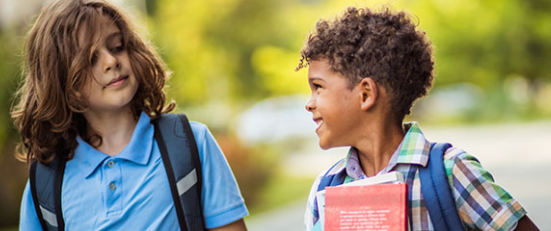Parent Partnerships

Nurturing young boys’ friendships
By Maggie Dent
There are a couple of factors in helping our kids in the early years at school. One is a warm connected relationship with the teacher or education assistant. The other is having at least one friend they can rely on at school.
Boy friendships are fragile
Since boys often talk later (and less) than girls, little boys can struggle with friendships. I am astounded at the capacity of most little girls to have real conversations that explore things friends have in common, help them play games and negotiate, and experience mutually bonding moments. Girls also tend to have a better grasp on the non-verbal cues of building rapport such as smiling, waving, and hugging.
One of the world’s leading boy experts, Dr William Pollack, author of Real Boys, believes that while girls communicate more, boys seek connection more indirectly through activities or play. So, for boys to bond they need significant amounts of time spent playing with other boys.
Boys need play to facilitate friendships
‘Play dates’ are a reasonably recent happening. Years ago, children tended to play for hours either in each other’s backyards or at sporting events. Now, less recess and lunch time at school, remote learning, and more emphasis on technology than real play is impacting this key window of building emotional and social skills.
We need to create opportunities outside of school. Finding families in your neighbourhood with kids of similar ages and older is still an excellent way of creating friendships. Yes, it involves some scheduling, but many families still make time to gather maybe one afternoon a week in the same playground with the same grownups and kids to create cohesion.
Play has many benefits other than the obvious one of helping our boys discharge excess energy and stress. Unstructured play helps to create feel-good neurochemicals, especially when it allows kids to follow the often-unspoken randomness of boy play which frequently includes adventures, hunts, and targets. It teaches them to lose, to wait, to take turns and much more.
Coaching young boys
I often share the story of the little boy who at the end of the day at school ran up to his best little mate and punched him in the head. In no way did this little boy mean to hurt his friend however at that moment his actions, which looked confusing to everybody, were an attempt to express how much he liked his friend and how much he was going to miss him.
Helping boys to create (and practice!) welcoming and farewell strategies can help alleviate some of these awkward moments. Giving a high five, having a secret handshake, teaching them to smile and calling out ‘hello’ using their friend’s name are all great strategies to coach and teach.
Having a friend at school can make a huge difference to our boys, but sometimes they need a little help from parents to find their way.


